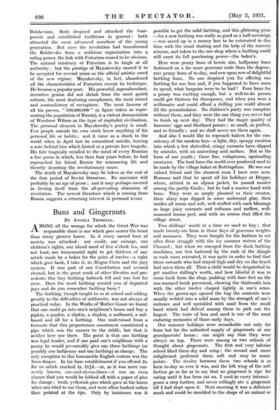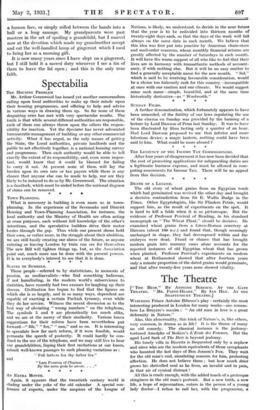Buns and Gingernuts
BY ANGELA TEIRKELL
AMONG all the wrongs for which the Great War was responsible there is one which goes nearer the heart than many greater losses. In it every sacred base of society was attacked : our credit, our coinage, our children's rights, our island meal of five o'clock tea, and not least, our inunemorial right to get thirteen of any article made by a baker for the price of twelve—a right which goes back, I take it, to Magna Carta and the jury system. It was part of our Constitution and seemed eternal, but in the great crash of other liberties and pre- cedents this tiny farthing bulwark fell and was lost for ever. Does the word farthing remind you of departed joys and do you remember farthing buns ?
The farthing, though taught to us at school and adding: greatly to the difficulties of arithmetic, was not always of practical value. In the Works of Mother Goose we learnt that one could go into one's neighbour's house and buy a pipkin, a popkin, a slipkin, a slopkin, a nailboard, a sail- board and all for a farthing. One understood from a footnote that this preposterous assortment constituted a pipe which was the answer to the riddle, but that is neither here nor there. The point is that one farthing was legal tender, and if one paid one's neighbour with a penny he would presumably give one three farthings (or possibly one halfpenny and one farthing) as change. The only exception to this honourable English custom was the linen-draper. In his base establishment if you offered 2s. for an article marked is. Md.—or, as it was more cur- rently known, one-and-eleven-three---it was an even chance that you would be fobbed off with a paper of pins for change ; weak, yellowish pins which gave at the knees when one tried to use them, and were often hooked rather than pointed at the tips. Only by insistence was it possible to get the solid farthing, and this glittering prize —for a new farthing was really as good as a half-sovereign —was saved up in a money box to be extricated in due time with the usual shaking and the help of the nursery scissors, and taken to the one shop where a farthing could still exert its full purchasing power—the baker's.
Here were penny buns of heroic size, halfpenny buns fashioned on a far more generous scale than the degene- rate penny buns of to-day, and row upon row of delightful farthing buns. No one despised you for offering one farthing for one bun and, if you happened to have more to spend, what bargains were to be had ! Four buns for a penny was exciting enough, but a well-to-do person could get thirteen for threepence, and when you were a millionaire and could afford a shilling you could almost fill the perambulator. No children's party was complete without them, and they were the one thing you never had to finish up next day. They had the magic quality of bantams' eggs and Shetland ponies ; so small, so perfect, and so friendly ; and we shall never see them again. • And also I would like to reproach bakers for the con- sistency of the modern bun—a light, dry, spongy creation into which a few shrivelled, stingy currants have slipped by mistake, with an uninviting arid surface. Not so the buns of our youth ; those fine, voluptuous, upstanding creatures. The best buns the world ever produced used to be made by the village baker at Rottingdean. He was our valued friend and the stoutest man I have ever seen. Rumour said that he spent all his holidays at Dieppe, where, attired in an alpaca jacket, he passed muster among the portly Gauls ; but he had a master hand with buns. They were as amply planned as their creator, their shiny tops dipped in some ambrosial glue, their insides all warm and soft, well stuffed with such blessings as large juicy currants and sultanas and mellow, well- seasoned lemon peel, and with an aroma that filled the village street.
Two shillings' worth at a time we used to buy ; that made twenty-six buns in those days of generous weights and measures. They were bought for the bathers to eat after their struggle with the icy summer waters of the Channel ; but when we emerged from the dank bathing machines, our feet battered by the rush of the shingle as each wave retreated, it was quite in order to find that those cowards who had stayed high and dry on the beach had eaten them all. Then a child would be despatched to get another shilling's worth, and how blissful it was to come back from the shop, padding with bare feet on the sun-warmed brick pavement, chewing the thirteenth bun with the other twelve clasped tightly in one's arms. When the grown-ups opened the bag the contents were usually welded into a solid mass by the strength of one's embrace and well sprinkled with sand from the small hand which had delved among them to pick out the largest. The taste of bun and sand is one of the most enduring memories of those early days.
Our summer holidays were remarkable not only for buns but for the unlimited supply of gingernuts at our grandparents' house ; one might say that they were always on tap. There were among us two schools of thought about gingernuts. The first and very inferior school liked them dry and crisp ; the second and more enlightened preferred them soft and easy to mani- pulate. The rivalry between these two schools is as keen to-day as ever it was, and the left wing of the soft faction go so far as to say that no gingernut is ripe for eating until it has been sat on. I used..to carry intransi- gence a step further, and never willingly ate a gingernut till I had slept upon it. Next morning it was a delicious mush and could be moulded to the shape of an animal or a human face, or simply rolled between the hands into a ball or a long sausage. My grandparents were past masters in the art of spoiling a grandchild, but I marvel now at the devotion which made my grandmother accept and eat the well-handled lump of gingernut which I used to bring her as a morning gift.
It is now many years since -I have slept on a gingernut, but I still hold it a sacred duty whenever I see a tin of them to leave the lid open ; and this is the only true faith.





































 Previous page
Previous page